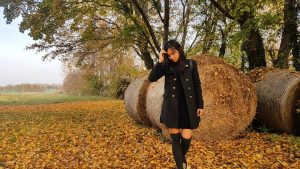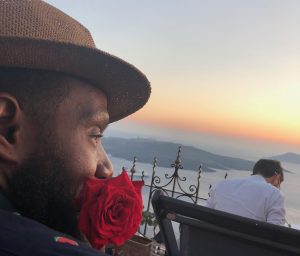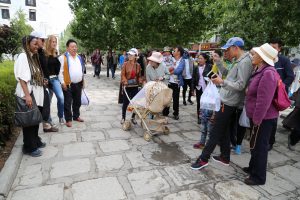
Taking on the world and changing narratives
Taking On The World & Changing Your Story Exploring the world as a black female travelling alone comes with its challenges. But it is also
Nastacia’s journey has been epic. She’s been to a little less than 40 countries, and has experienced the good, the bad and the ugly that comes with exploring the world.
Her journeys have taken her to Jamaica, Scotland, Italy, Korea, China, Vietnam, Laos, Latin America, Panama, Thailand, India, Taiwan, Kazakhstan, Myanmar, Jordan, Mongolia, Cambodia and many others.
Ultimately, she developed lifelong friendships and learned a great deal from her spectacular adventures and immersed herself in local cultures and communities.
After studying Economics and International Business at university, Nastacia developed a taste for adventure.
She also completed a course called Doing Business in Latin America, which included a week-long trip to Panama during her senior year.
This set her off on a journey to study abroad in China. During this time, she took field trips to Vietnam and Laos for two summers.

It hasn’t always been easy for Nastacia, who has worked and studied abroad. Working in unfamiliar territory brought its own challenges.
Nastacia explained that both her best and worst adventures were in South Korea. One of the best things to happen in South Korea was the opportunity it gave her to meet interesting people and travel to neighbouring countries.
She said: “I figured I will not have this opportunity again to explore various parts of South Korea on the weekends and travel to other neighbouring countries during the extended break 3-6 times a year. So that’s how I spent my free time (besides studying Korean).
“This made it possible to meet many amazing and quirky people, develop great friendships, and expand my knowledge and perspective on various cultures, religions, politics and most importantly about myself.”
But the real rewards came from making a difference in the lives of the young children she taught and inspiring them to overcome their misconceptions about different people.
She added: “The majority of my students were not exposed to many foreigners, especially black ones. I remember on the first day being introduced to my K-6 grade students (the entire school had about 70 students). Most of my kindergarten students viewed me as an alien or clown as they ran towards me to be entertained.
“One student’s facial expression was a complete 180 – she was absolutely terrified/skeptical of me and always kept her distance. As the months progressed, she began to participate and interact with me more to the point that she would even initiate high fives with me. Fast forward to two years later, she’s in the second grade and there is a new student at the school that was sitting next to her in class.
“When the new student saw me, she burst out laughing and exclaimed in Korean, “It’s an African.” My student jumped in immediately and said in Korean ‘Her name is Staci Teacher, she is from America, she is the English teacher and she is really funny.’
“Overhearing her made me realize that besides exposing my students to the English language, I was already making a positive impact on how they view those from the African diaspora and to challenge mocking/negative things that are usually said about us within their society.”

However, working abroad as a black traveller abroad comes with other challenges, and this was certainly case for Nastacia.
While she had a unique opportunity to experience the South Korean countryside, there were also times when she was not supported by other teachers and sometimes the students were not so accepting.
Even after moving to a different school, problems still persisted, only this time with coworkers.
There she came face-to-face with a lack of understanding and acceptance. However, what struck me about Nastacia was her resilience. While life in Korea could be difficult at times, she still came out on top.
Here she describes her experiences with teaching in other parts of Korea.
She said: “At one point during my first two years in Korea, I developed ulcer pains and dreaded going to work. The students’ homeroom teacher did not give me the opportunity to set the tone and establish classroom rules and expectations during my first week so it led to the students viewing me simply as a substitute teacher that they did not have to pay attention to.
“They drew obscene pictures on the back of assignments, disregarded my instructions, told me that I was a “fool”, “f*ck you”, and was “ugly as shit.” I tried my best to explain in the simplest terms why what they were doing is wrong and I even informed other teachers about what happened but they always let things slide because, ‘they did not understand what they were saying/doing.’ Which is ridiculous and insulting to the students’ intelligence, honestly.”
(The above drawing was one of the many drawn by some of the less charming students)
While the students were much better behaved, her coworkers were not and would often open her private mail, “forget” to give her important updates relating to her job and were generally disrespectful.
She added: “I didn’t enjoy living in the countryside during my first two years in Korea so I was ecstatic to transfer to the biggest city in my province for my final two years of teaching. I was pleased that my city students were better behaved than my rural students and I sincerely enjoyed my time living and working there.
“Sadly, that was not necessarily the case with my coworkers; some of my “mentor teachers/supervisors” made things unreasonably harder for me.”
She also came across stereotypes in other countries, with people making assumptions about black travellers. However, none of these misconceptions, according to Nastacia, were any worse than the ones she encountered in her home country of the US.
She said: “Overall, I wouldn’t say that the stereotypes were worse abroad compared to the US because for many, they did not have much exposure to black people besides the undesirable images that Hollywood depicts globally. For the most part, my interactions with locals in various countries have been positive.”

She also came across stereotypes in other countries, with people making assumptions about black travellers. However, none of these misconceptions, according to Nastacia, were any worse than the ones she encountered in her home country of the US.
She said: “Overall, I wouldn’t say that the stereotypes were worse abroad compared to the US because for many, they did not have much exposure to black people besides the undesirable images that Hollywood depicts globally. For the most part, my interactions with locals in various countries have been positive.”
With her being the only black traveller that many people encountered, Nastacia explained how she was extra aware and careful with how she came across because people often base their perception of an entire race based on the very few they meet.
She added: “For the most part, my interactions with locals in various countries have been positive. I had to be cognizant of how I acted because I might be one of the few black people they get to be in contact with. Therefore, most likely from their perspective, my actions and behaviour didn’t portray just myself as an individual but characteristics of my entire race.”

However, while some of her experiences as a black traveller living abroad were less than desirable, others were just plain funny.
She has been mistaken for being Halle Berry and even Obama!
Nastacia said: “I’ve had child vendors in India yell out “Obama” when they see me, a Korean man say I look like Halle Berry as a pick-up line, and a couple of Filipinos say my friend and I were beautiful while walking down the street. What surprised me, when I was doing my internship in Shanghai, was when a Chinese man debated with my roommates that I was from India.
“I’ve also had a waitress at a Chinese restaurant in Korea think I was from Malaysia (because I had a head wrap on) and locals in Cartagena, Colombia gravitate towards me to initiate conversation although my Latina friends in the group were actually the native Spanish speakers. Other stereotypes I have faced, unfortunately, is men (ranging from Koreans to South Asians to West Africans) assuming I am “easy” and would want to go to a motel with them on the first date.”
On another occasion, a South Korean children’s book writer secretly drew a picture of her at a hostel. He then showed it to her afterwards.

The truth is that when you travel to countries where people are not like you, this naturally generates a fair amount of curiosity.
That’s part of the beauty of travelling – knowing that you may be a source of fascination to people who have never before encountered someone like you.
This is true of white travellers who explore Asia and Africa – but especially so for black travellers, with kinky hair being a particular source of fascination.
Natascia said: “Many were fascinated by my hair texture, which was a great way to initiate interaction even if we had to communicate, at times, through body language. My student once had her mom plait braids into her hair to look similar to my box braids.”
However, surprisingly some students in South Korea were very aware of the issues impacting black people in other parts of the world.
For Nastascia, it provided an opportunity to start a dialogue and give more context from her own perspective.
She recounted a time when three South Korean students asked her about police brutality towards black people in America.
“I was surprised that my some of my students were aware of the police brutality going on against black people in the US. Three sixth grade boys came to my office during lunchtime to ask me more about it. I tried my best to explain with a combination of my limited Korean, their limited English, Google translate, and photos from Google images to summarize the Slave Trade, the Civil Rights Movement and modern-day racism.
“I really appreciated their curiosity to understand why this was happening, especially since most of the adults I have met there were more concerned about frivolous things such as why I did not have a boyfriend or ate meat.”

While travelling comes with its own challenges, Nastacia said that she gained a great deal from her experiences as a black traveller. Her adventures have enriched her life and understanding of the world and the cultures that reside within it.
The truth is that wherever we are on the planet, we will have our ups and downs. But by travelling to far-flung places, we get to write our own story.
It means that we don’t rely on heavily edited and distorted media snippets to learn about what really goes on in the world. We get to see cultures, countries and history through our own eyes and not through the eyes of others.
Moreover, people in other parts of the world get to learn about us through their own experiences rather than negative media portrayals – or even racist stereotypes spread by other travellers.
There are places in the world where black and even white people are unfamiliar and subject to curiosity and occasionally, ignorance.
However, ignorance towards black people is present everywhere – and it is usually more acute and potentially fatal in Western countries such as America, than it is in non-Western parts of the world.

The key to having the adventure of a lifetime, according to Nastacia, is doing your research. By researching the place you intend to go to in advance and reading the stories of other black people who have visited those destinations, you can ensure that you are prepared for your overseas adventures.
She added: “Seek information about the area in advance so there are no negative surprises, especially if you are going to be travelling alone. That includes researching how to say important phrases in the local language, the safest and most efficient way to get to your accommodation, your method of transportation during your stay and other details.”
If you want to read more about Nastacia’s journey, you can follow her on Instagram at @ReroutedEndeavors.
For more information and tips for black travellers, other minority nomads and advice for solo female travellers, visit our Travel Tips page.
No matter what your ethnicity, background or gender is, you will be sure to find something useful for your journey.
This blog is designed to inspire you and build an online community where you can get all the resources you need to travel. The Backpackers Travel Hub was created to make travelling accessible to everyone – not just the posh people! So drop by and visit the Facebook Group Backpackers Travel Hub. The group contains exclusive tips, and content designed to inspire, motivate and empower you. No sales or annoying gimmicks – just good, solid content. You can also take a peek at the JaninesJourneys Facebook page here. Happy travels!

Taking On The World & Changing Your Story Exploring the world as a black female travelling alone comes with its challenges. But it is also

Experiencing The Beauty Of The World As an Asian Traveller Fitria Anggrainy Yusuf has faced many challenges and bigotry as an Asian traveller. But her

Embracing The World And Living Your Best Life Derek Johnson, 40, is a black traveler with an amazing story to share. I must say his

I hear it all the time. “Is it safe to travel as a solo female backpacker?” To be honest, I asked myself the same question

And there I was in Tibet’s capital, Lhasa, taking in the scenery and smiling at the curious onlookers who were staring at me in bewilderment,

Chaos, crowds and humidity greeted me as I stepped off the plane in Nepal and landed at its main airport, Tribhuvan. After a two week
